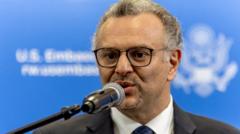U.S. Senior Advisor for Africa, Massad Boulos, asserts that President Trump values Africa, even with significant aid reductions causing distress on the continent. This article explores the implications of these policies, highlighting concerns over health program cuts, trade negotiations, and the potential impact on U.S.-Africa relations.
Trump’s Divisive Policies: An Insight into U.S.-Africa Relations

Trump’s Divisive Policies: An Insight into U.S.-Africa Relations
Despite sweeping aid cuts, U.S. envoy stresses President Trump's commitment to Africa amid rising concerns over humanitarian issues.
U.S. Senior Advisor for Africa, Massad Boulos, conveyed a message on BBC Newsday about President Donald Trump's perceived value of Africa, despite the administration implementing extensive cuts in aid that have led to notable humanitarian challenges throughout the continent. Trump initiated these cuts on his first day in office, aligning with his "America First" approach to foreign policy. Boulos's remarks come amid fears that tariffs introduced by the Trump administration could disrupt a key trade agreement aimed at fostering economic growth between the U.S. and African nations.
In his interview, Boulos sought to dispel rumors regarding potential U.S. mission closures in Africa, asserting that Trump appreciates both the continent and its people. However, the ramifications of the aid freeze have been severe, especially concerning health initiatives critical for many African nations. The World Health Organization (WHO) warned that particularly vulnerable countries, including Nigeria, Kenya, and Lesotho, could soon exhaust their supplies of essential HIV medications due to these funding cuts. The Institute for Security Studies (ISS) has projected that nearly six million additional Africans may be pushed into extreme poverty in the forthcoming year as a result of these aid reductions.
Tragically, instances highlighting these consequences were emphasized in recent reports, such as the deaths of eight individuals—five of whom were children—who perished while seeking cholera treatment in South Sudan, where local health clinics have been forced to shutter due to U.S. aid cuts. Boulos maintained, however, that it is vital for the U.S. to reassess aid programs to guarantee efficiency and transparency in fund utilization.
Furthermore, Boulos shared insights from his recent trip to the Democratic Republic of Congo (DRC), where U.S. companies have shown interest in mineral extraction. Various resources, including vital lithium for batteries, make the DRC economically significant. President Félix Tshisekedi of the DRC believes that increased U.S. involvement in the mineral sector could help address ongoing violence exacerbated by Rwandan-backed rebels in the region.
While the U.S. has interests in surrounding nations such as Rwanda, Boulos stressed that efforts must first focus on resolving the conflict between Rwanda and the DRC. He rebuffed accusations that the U.S. is primarily driven by self-interest in Africa, asserting that their role includes fostering U.S. interests while establishing valuable strategic partnerships. Notably, Trump's desire to "end wars and establish peace" was underscored as a fundamental component of the administration's approach to the region.
Boulos, a businessman with investments in West Africa, asserts that Trump aims to dismantle the "unfair advantages" that foreign investors have previously exploited in African markets. However, the impact of new trade tariffs, particularly on the small southern African nation of Lesotho—which experienced a staggering 50% tariff on its textile exports—has raised additional questions about the future of trade relations under current policies.
As negotiations continue, Boulos remarked that many nations are engaging with the U.S. to seek a more equitable framework that benefits both parties. However, as the African Growth and Opportunity Act (Agoa) came under scrutiny, analysts remain concerned about its potential renewal under a Republican-led Congress. The underlying tension of U.S.-Africa relations remains pivotal, as both humanitarian concerns and economic strategies intersect in an evolving geopolitical landscape.




















